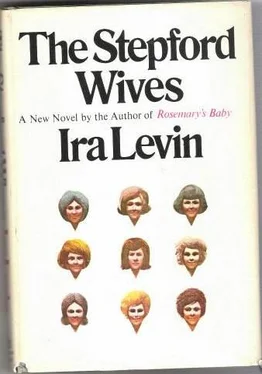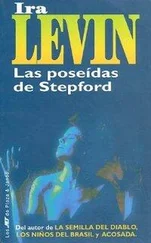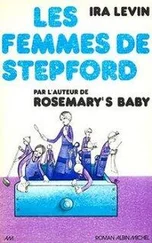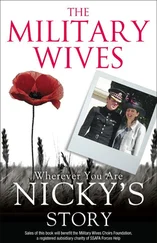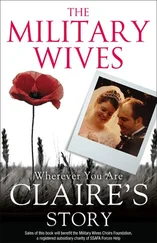Dr. Fancher said, "Begun to suspect what?"
She drew her hands apart and wiped them on her skirt. "I've begun to suspect that the men are behind it," she said. She looked at Dr. Fancher.
Dr. Fancher didn't smile or seem surprised. "Which men?" she asked.
Joanna looked at her hands. "My husband," she said. "Bobbie's husband, Charmaine's." She looked at Dr. Fancher. "All of them," she said.
She told her about the Men's Association.
"I was taking pictures in the Center one night a couple of months ago," she said. "That's where those Colonial shops are; the house overlooks them.
The windows were open and there was-a smell in the air. Of medicine, or chemicals. And then the shades were pulled down, maybe because they knew I was out there; this policeman had seen me, he stopped and talked to me."
She leaned forward. "There are a lot of sophisticated industrial plants on Route Nine," she said, "and a lot of the men who have high-level jobs in them live in Stepford and belong to the Men's Association. Something goes on there every night, and I don't think it's just fixing toys for needy children, and pool and poker.
There's AmeriChem-Willis, and Stevenson Biochemical. They could be-concocting something that the Department of Health wouldn't know about, up there at the Men's Association…" She sat back in the chair, wiping her hands against her skirted thighs, not looking at Dr. Fancher.
Dr. Fancher asked her questions about her family background and her interest in photography; about the jobs she had held, and about Walter and Pete and Kim.
"Any move is traumatic to a degree," Dr. Fancher said, "and particularly the city-to-the-suburbs move for a woman who doesn't find her housewife's role totally fulfilling. It can feel pretty much like being sent to Siberia." She smiled at Joanna. "And the holiday season doesn't help matters any," she said. "It tends to magnify anxieties, for everyone.
I've often thought that one year we should have a real holiday and skip the whole business."
Joanna made a smile.
Dr. Fancher leaned forward, and joining her hands, rested her elbows on the desk. "I can understand your not being happy in a town of highly home- oriented women," she said to Joanna.
'I wouldn't be either; no woman with outside interests would. But I do wonder-and I imagine your husband does too-whether you would be happy in Eastbridge, or anywhere else at this particular time."
"I think I would be," Joanna said.
Dr. Fancher looked at her hands, pressing and flexing the wedding-ringed one with the other. She looked at Joanna. "Towns develop their character gradually," she said, "as people pick and choose among them. A few artists and writers came here to Sheffield a long time ago; others followed, and people who found them too Bohemian moved away. Now we're an artists-and-writers town; not exclusively, of course, but enough to make us different from Norwood and Kimball. I'm sure Stepford developed its character in the same way. That seems to me far more likely than the idea that the men there have banded together to chemically brainwash the women. And could they really do it? They could tranquilize them, yes; but these women don't sound tranquilized to me; they're hardworking and industrious within their own small range of interests. That would be quite a job for even the most advanced chemists."
Joanna said, "I know it sounds-" She rubbed her temple.
"It sounds," Dr. Faucher said, "like the idea of a woman who, like many women today, and with good reason, feels a deep resentment and suspicion of men. One who's pulled two ways by conflicting demands, perhaps more strongly than she's aware; the old conventions on the one hand, and the new conventions of the liberated woman on the other."
Joanna, shaking her head, said, "If only you could see what Stepford women are like. They're actresses in TV commercials, all of them. No, not even that. They're they're like-" She sat forward. "There was a program four or five weeks ago," she said. "My children were watching it. These figures of all the Presidents, moving around, making different facial expressions.
Abraham Lincoln stood up and delivered the Gettysburg Address; he was so lifelike you'd have-" She sat still.
Dr. Fancher waited, and nodded. "Rather than force an immediate move on your family," she said, "I think you should con-"
" Disneyland," Joanna said. "The program was from Disneyland…"
Dr. Fancher smiled. "I know," she said. "My grandchildren were there last summer. They told me they 'met' Lincoln."
Joanna turned from her, staring.
"I think you should consider trying therapy," Dr. Fancher said. "To identify and clarify your feelings. Then you can make the right move-maybe to Eastbridge, maybe back to the city; maybe you'll even find Stepford less oppressive."
Joanna turned to her.
"Will you think about it for a day or two and call me?" Dr. Fancher said.
"I'm sure I can help you. It's certainly worth a few hours' exploration, isn't it?"
Joanna sat still, and nodded.
Dr. Fancher took a pen from its holder and wrote on a prescription pad.
Joanna looked at her. She stood up and took her handbag from the desk.
"These will help you in the meantime," Dr. Fancher said, writing.
"They're a mild tranquilizer. You can take three a day." She tore off a slip and offered it to Joanna, smiling. "They won't make you fascinated with housework," she said.
Joanna took the slip.
Dr. Fancher stood up. "I'll be away Christmas week," she said, "but we could start the week of the third. Will you call me Monday or Tuesday and let me know what you've decided?"
Joanna nodded.
Dr. Fancher smiled. "It's not catastrophic," she said. "Really, I'm sure I can help you." She held out her hand.
Joanna shook it and went out.
THE LIBRARY WAS BUSY. Miss Austrian said they were down in the cellar. The door on the left, the bottom shelf. Put them back in their proper order.
No smoking. Put out the lights.
She went down the steep narrow stairs, touching the wall with one hand.
There was no banister.
The door on the left. She found the light switch inside. An eye-sting of fluorescence; the smell of old paper; the whine of a motor, climbing in pitch.
The room was small and low-ceilinged. Walls of shelved magazines surrounded a library table and four kitchen chairs, chrome and red plastic.
Big brown-bound volumes jutted from the bottom shelf all around the room, lying flat, piled six high.
She put her handbag on the table, and took her coat off and laid it over one of the chairs.
She started five years back, leafing backward through the half-a-year volume.
CIVIC AND MEN'S ASSOCIATIONS TO MERGE. The proposed union of the Stepford Civic Association and the Stepford Men's Association has been endorsed by the members of both organizations and will take place within weeks.
Thomas C. Miller III and Dale Coba, the respective presidents…
She leafed back, through Little League ball games and heavy snowfalls, through thefts, collisions, school-bond disputes.
WOMEN'S CLUB SUSPENDS MEETINGS. The Stepford Women's Club is suspending its bi-weekly meetings because of declining membership, according to Mrs.
Richard Ockrey, who assumed the club's presidency only two months ago on the resignation of former president Mrs. Alan Hollingsworth. "It's only a temporary suspension," Mrs. Ockrey said in her home on Fox Hollow Lane.
"We're planning a full-scale membership drive and a resumption of meetings in the early spring Do tell, Mrs. Ockrey.
She leafed back through ads for old movies and lowpriced food, through fire at the Methodist Church and the opening of the incinerator plant.
MEN'S ASSOCIATION BUYS TERHUNE HOUSE. Dale Coba, president of the Stepford…
Читать дальше
